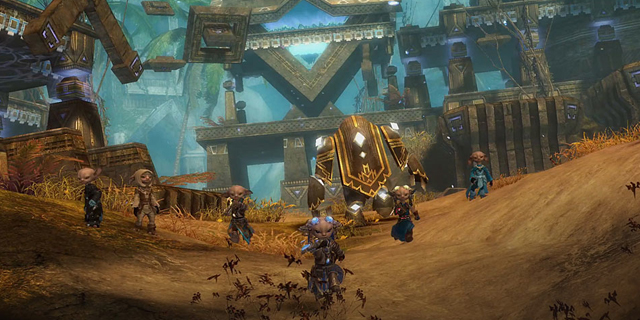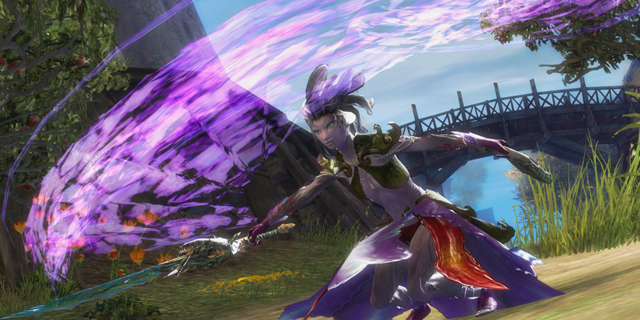
MMOs are too large in scope to be covered by our traditional review process. So here’s what we’re doing instead: giving you a “first draft” with thoughts from the initial days of a world, then circling back in a few weeks with a fleshed-out look at the final game and high-level experience. Read our earlier impressions here.
Guild Wars 2 continues to deliver the same experience as you move into higher level zones. There aren’t really many new types of events happening, but the new zones remain interesting. One of the most interesting additions to the game, which I failed to mention last time, are jumping puzzles. These are platforming sections that involve finding your way through an area using tricky jumps or navigating a maze. At the end, there is usually an achievement and a loot chest. This is one of the more rewarding experiences I’ve had while exploring zones in an MMO, while also becoming one of the most aggravating.

Dungeons are similar to what we know from most other MMOs. For one, the challenge is greater, as is the reward. Instead of simply joining to fight on the overworld, dungeons involve preparation and planning, as well as teamwork. It is much easier to get a group together, as Guild Wars 2 lacks a dedicated healer role; this doesn’t mean healing isn’t an important aspect of the game, but it is shared by the whole party, and doesn’t leave one person with a more difficult task in the group.
World Encounters are another major aspect of high-level content. The four dragons, along with other major bosses who happen to be the main antagonists of the storyline, will attack areas of the overworld. This is an encounter that anyone can join, but many players will be needed to complete it. Like any event, the reward is distributed based on participation, but it’s fun to see even when outleveled. Unlike many games which keep their antagonists inside max-level instances, it greatly helps to see this big danger to the world out causing trouble.
It also helps that anyone can participate, not just a select few who have memorized an entire dungeon as a group, a common necessity for the hardest content in other games. I have a feeling this aspect may not appeal to many of the high-end players from other games, but ArenaNet has made a good attempt to build a game where everyone sees storylines unfolding, not just the top guilds on a server. These encounters are not random, but triggered by storyline events.

After level 25, each profession will have most of its core abilities, giving a better idea of how they play. With my engineer, I found myself switching between a rifle (for long-range or single targets) and a flamethrower kit (for short-range area attacks). Each profession has a similar choice of skill sets to choose from, which leads to a lot of versatility. If you keep up with your crafting skills, you will get a lot of gear upgrades through them. The system allows for tailoring items for the stats you are looking for.
The game’s Auction House had a few glitches for the first couple weeks of the game, and is now fully functional again. It helps greatly with profiting from crafting skills. Buying and selling don’t work quite like a real auction house, as there aren’t any actual auctions. Players can put an item or a stack of items up for sale, or they can request an amount of items to buy. This offers sellers a choice: to sell immediately to the lowest-priced buy order, or to set up a sell order for a higher price.
Generally patience will be rewarded in both buying and selling, though filling buy orders can lead to faster profit. The system removes many of the opportunities for scamming seen in an auction system, as well as removing the randomness that comes from bidding on an auction that may not end for another 48 hours.

While I have talked in detail about how the game changes basic mechanics for the better, I would not say it removes the grinding from the MMO. The game will still feel repetitive, and is very much still an MMO for MMO fans. The combat system rewards mobility, however it is still a battle of numbers, not skill. It remains an MMO, not an action-RPG. However, both due to the lack of a fee and the changes to how endgame works, this is a game you can take your time with and avoid rushing to the end, yet still experience everything it has to offer.
Guild Wars 2 changes the accepted rules of the MMO genre in a way that moves it forward. Not in its major content or mechanics, but in the small changes. How ArenaNet manages additional content will really decide how well this game will grow going forward.
Pros: Refreshing new ideas for the genre, rewards co-operation without requiring it.
Cons: Still feels a bit repetitive over long periods.



















